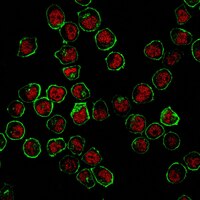06-1130-I Sigma-AldrichAnti-RNF168 Antibody
Anti-RNF168, Cat. No. 06-1130-I, is a highly specific rabbit polyclonal antibody that targets RNF168 and has been tested in Immunocytochemistry, Immunoprecipitation, and Western Blotting.
More>> Anti-RNF168, Cat. No. 06-1130-I, is a highly specific rabbit polyclonal antibody that targets RNF168 and has been tested in Immunocytochemistry, Immunoprecipitation, and Western Blotting. Less<<Recommended Products
Overview
| Replacement Information |
|---|
Key Spec Table
| Species Reactivity | Key Applications | Host | Format | Antibody Type |
|---|---|---|---|---|
| H | ICC, IP, WB | Rb | Affinity Purified | Polyclonal Antibody |
| References |
|---|
| Product Information | |
|---|---|
| Format | Affinity Purified |
| Presentation | Purified rabbit polyclonal antibody in buffer containing 0.1 M Tris-Glycine (pH 7.4), 150 mM NaCl with 0.05% sodium azide. |
| Quality Level | MQ100 |
| Physicochemical Information |
|---|
| Dimensions |
|---|
| Materials Information |
|---|
| Toxicological Information |
|---|
| Safety Information according to GHS |
|---|
| Safety Information |
|---|
| Storage and Shipping Information | |
|---|---|
| Storage Conditions | Stable for 1 year at 2-8°C from date of receipt. |
| Packaging Information | |
|---|---|
| Material Size | 100 µL |
| Transport Information |
|---|
| Supplemental Information |
|---|
| Specifications |
|---|
| Global Trade Item Number | |
|---|---|
| Catalogue Number | GTIN |
| 06-1130-I | 04054839088582 |
Documentation
Anti-RNF168 Antibody MSDS
| Title |
|---|
Anti-RNF168 Antibody Certificates of Analysis
| Title | Lot Number |
|---|---|
| Anti-RNF168 - 3393283 | 3393283 |
| Anti-RNF168 - 3558930 | 3558930 |
| Anti-RNF168 - 3877602 | 3877602 |
| Anti-RNF168 - 4122588 | 4122588 |
| Anti-RNF168 -Q2767887 | Q2767887 |









